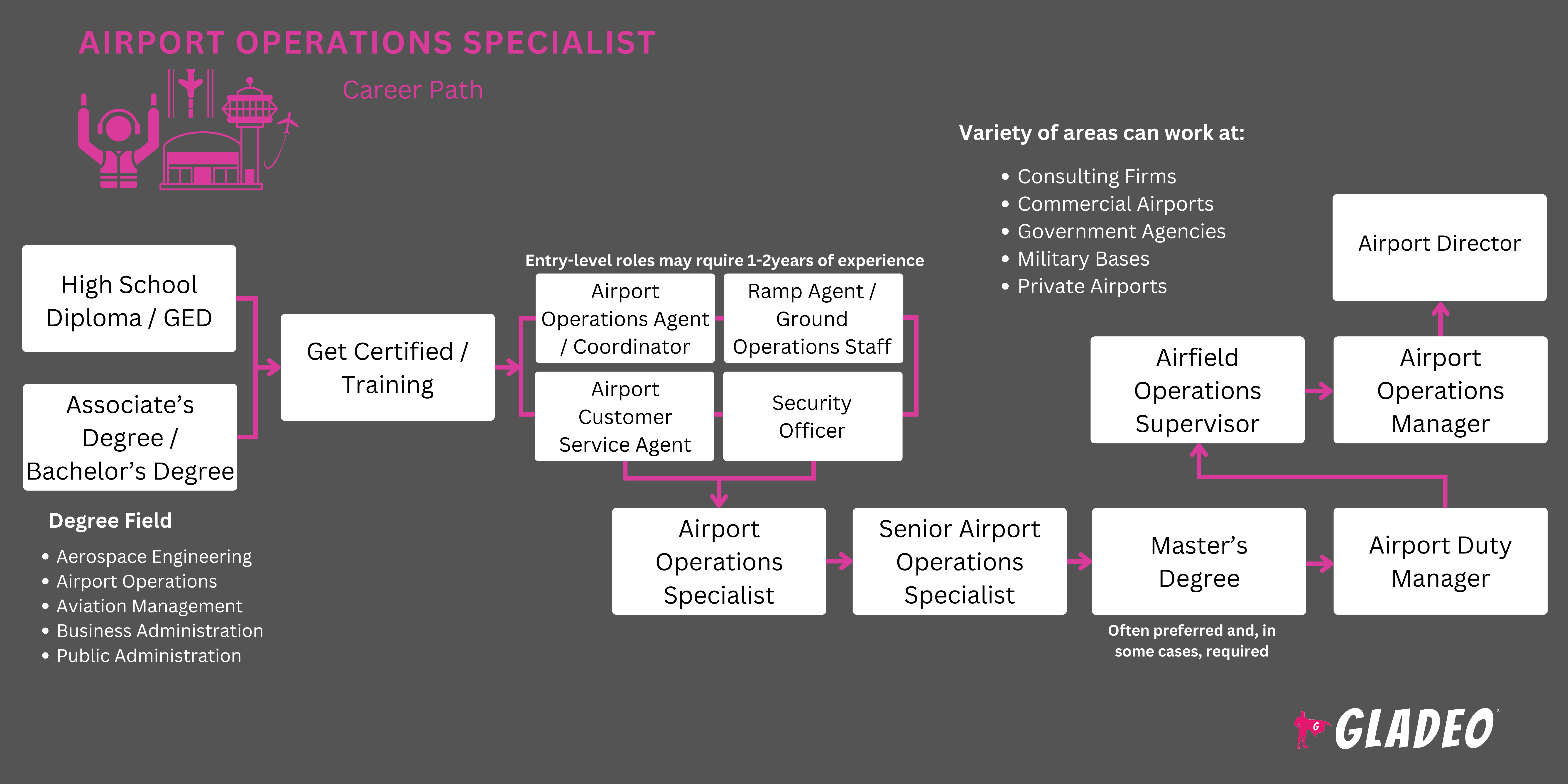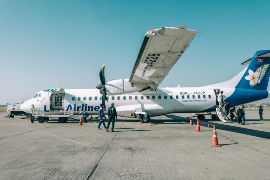聚光灯
Airfield Operations Specialist, Airport Operations Agent, Airport Operations Coordinator, Airport Operations Officer, Airport Operations Specialist, Flight Follower, Operations Agent, Operations Coordinator, Operations Officer, Operations Specialist
Airports are like small cities—they run 24/7, and everything must work seamlessly to keep planes moving safely. The people making sure that happens behind the scenes are Airport Operations Specialists.
These professionals monitor runways, taxiways, and terminal areas to make sure everything meets safety and security standards. They coordinate daily airfield inspections, respond to emergencies, and work closely with airlines, air traffic control, and security teams to ensure operations run smoothly.
This is a job for someone who enjoys structure, responsibility, and quick decision-making. It blends fieldwork with office coordination, requiring both technical knowledge and calm leadership. Whether it’s managing a bird strike, responding to a runway incident, or ensuring the airfield is ready for a busy morning, Airport Operations Specialists play a vital role in keeping the aviation system safe and efficient.
- Playing a crucial role in keeping passengers and aircraft safe.
- Working in a dynamic, fast-paced environment where no two days are the same.
- Building strong teamwork with airlines, air traffic controllers, and emergency services.
- Seeing aircraft take off and land smoothly because of your work.
工作日程
Airport Operations Specialists typically work full-time, often on rotating shifts, weekends, and holidays. Airports operate around the clock, so flexibility is essential. Night shifts, early mornings, and being on-call during weather events or emergencies are common.
典型职责
- Inspect runways, taxiways, ramps, and lighting systems for safety compliance.
- Coordinate with air traffic control and airline personnel regarding aircraft movement.
- Respond to and report incidents such as foreign object debris, bird strikes, or runway obstructions.
- Ensure the airport complies with regulations from Federal Aviation Administration (FAA) or local aviation authorities.
- File and maintain operations reports and logs.
- Issue and cancel NOTAMs (Notices to Air Missions) to communicate airfield conditions.
额外责任
- Overseeing snow and ice removal or wildlife management programs.
- Monitoring security perimeters and coordinating emergency response plans.
- Assisting with special events like VIP arrivals or air shows.
- Supporting construction or maintenance projects that affect airfield operations.
- Participating in regular safety training, tabletop exercises, and emergency drills.
- Mentoring junior staff or interns on airport safety procedures.
A typical shift starts with a thorough airfield inspection—checking runway surfaces, lighting, signage, and weather conditions. Throughout the day, specialists monitor radio communications with air traffic control and coordinate with maintenance crews or emergency services as needed.
They might handle a wildlife incident, file a NOTAM about a taxiway closure, or escort maintenance crews on the tarmac. During storms or peak flight hours, the pace picks up dramatically.
As one veteran airport ops specialist explains, “You have to think fast, stay calm, and know the airfield like the back of your hand. Every decision impacts safety and flight schedules.”
软技能:
- 交流
- 决策
- 解决问题
- 注重细节
- 团队合作
- 压力管理
- 适应性
- Situational awareness
技术技能:
- Airfield inspection and maintenance
- Knowledge of FAA Part 139 regulations (or equivalent local rules)
- Aviation radio communication and phraseology
- Emergency response procedures
- Safety and security compliance
- GIS and mapping tools
- NOTAM filing and reporting systems
- Familiarity with weather monitoring and forecasting tools
- Airfield Operations Specialist – Focus on runway inspections, airside safety, and aircraft movement.
- Terminal Operations Specialist – Oversee passenger facilities, terminal flow, and landside operations.
- Safety and Compliance Specialist – Ensure adherence to all regulatory and emergency standards.
- Large commercial airports
- Regional or municipal airports
- Military air bases
- Private or corporate airports
- Airport management companies
Airport Operations Specialists must be ready for anything—from storms and flight delays to runway emergencies. The work can involve long shifts, overnight hours, and holiday duty. Safety issues can arise with little warning, so focus and calm under pressure are essential.
As one ops officer shared, “You can’t just clock out when something happens on the airfield. Planes don’t wait—so neither can we.”
- Automation & Technology: Airports are increasingly adopting digital inspection tools, real-time surface sensors, and data-driven decision systems.
- Sustainability: Operations teams play a growing role in managing environmental initiatives, like green taxiways and wildlife hazard management.
- Cybersecurity and Safety: With more systems connected digitally, specialists must stay alert to both physical and digital safety risks.
- Weather Resilience: Climate change is increasing the need for advanced emergency and weather response planning.
Many Airport Operations Specialists loved watching planes, learning about geography, or exploring how transportation systems work. Others enjoyed science, problem-solving, or being part of organized teams like scouts, ROTC, or school safety patrols.
While there’s no strict requirement to have a degree, most Airport Operations Specialists complete at least some aviation or transportation-related courses at a community college, technical school, or university.
Per O*NET OnLine, many specialists hold an associate or bachelor’s degree—often in fields like aviation management, airport operations, transportation, or business administration. Others enter the field with a high school diploma or GED plus specialized courses or certifications related to airport safety, logistics, or regulatory compliance.
常见的大学课程包括。
- Airport and Aviation Operations
- Aviation Safety and Security
- Airport Planning and Management
- Transportation Systems and Logistics
- Aviation Law and Regulations
- Emergency Response and Crisis Management
- Business Communication
- Air Traffic Control Systems
- Geography and Meteorology for Aviation
- Customer Service and Public Relations
In addition to classroom learning, employers typically provide several weeks of on-the-job training, focusing on daily airport operations, airfield safety procedures, communications systems, and regulatory compliance.
Optional Certifications and Training
- Airport Certified Employee (ACE) Program — American Association of Airport Executives
- Airfield Driver Training Certification
- Aircraft Rescue and Firefighting (ARFF) Training (for safety roles)
- OSHA and Safety Compliance Certifications
- FAA Part 139 Airport Certification knowledge (for U.S. airports)
Helpful Degree Programs
- Aviation Management
- Airport Management
- Transportation and Logistics
- Aerospace Studies
- Business Administration with an Aviation concentration
Students who want to get ahead can also pursue internships or cooperative programs at regional or international airports to gain real-world experience—a major advantage in this career path.
- Good high school courses to focus on include geography, mathematics, science, and business communication. Taking computer applications or technology classes can also be helpful since most airport operations systems are technology-driven.
- Consider joining a debate club or taking a speech class to sharpen your communication skills, which are essential when coordinating with pilots, ground crews, and air traffic controllers.
- Post-secondary course topics should include airport operations, aviation safety, transportation management, emergency planning, and business administration. If you’re not ready for a four-year degree, community colleges and technical schools offer aviation-related certificate programs that can be completed in less time.
- Search the web for local or online programs in aviation or airport management. Many reputable institutions offer flexible study options that let you learn at your own pace.
- Gaining customer service experience through part-time jobs—such as at hotels, travel agencies, or transportation hubs—can help build the people skills needed for airport operations.
- Ask your local airport about internships, volunteering, or job shadowing opportunities to get a real-world understanding of daily airport activities.
- Participating in programs like air cadets, aviation clubs, or student exchange programs can expose you to global travel and aviation systems.
- Attend aviation or transportation industry events to learn about trends and build professional connections early.
Look for schools that offer hands-on training, airfield operations labs, and internships with airports or airlines.
Great programs include:
- Embry–Riddle Aeronautical University – B.S. in Aviation Business Administration
- Purdue University – Aeronautical Technology
- Florida Institute of Technology – Aviation Management
- Southern Illinois University Carbondale – Aviation Management
- University of North Dakota – Aviation Management

- Start by searching for job openings on platforms like Indeed, LinkedIn, and USAJOBS (especially for positions at government or public airports).
- Use targeted keywords such as “Airport Operations Specialist,” “Airfield Operations,” “Airport Duty Officer,” or “Ramp Operations.”
- Apply for entry-level roles like Operations Assistant, Ramp Agent, Airport Operations Trainee, or Customer Service Representative to build your airfield knowledge.
- Highlight relevant internships, aviation coursework, and any certifications or training in your application. Demonstrating familiarity with FAA Part 139 regulations, safety protocols, or airfield procedures can make you stand out.
- Prepare for interviews by practicing how you would respond to emergency scenarios, work with different airport departments, and ensure smooth daily operations. Emphasize your communication, decision-making, and problem-solving skills.
- Consider joining professional organizations such as the American Association of Airport Executives to access job boards and career resources.
- Earn advanced certifications such as the Airport Certified Employee (ACE) credential or Certified Member (CM) program from the American Association of Airport Executives.
- Build expertise in specialized areas like emergency response, wildlife hazard management, safety inspections, or regulatory compliance.
- Volunteer to lead safety drills, coordinate operational projects, or train new employees—these experiences demonstrate initiative and leadership potential.
- Network actively by attending aviation conferences, job fairs, and industry workshops to connect with hiring managers and mentors.
- Seek out internal promotions or cross-training opportunities to broaden your operational knowledge.
- Target supervisory or management positions such as Operations Supervisor, Duty Manager, or Airport Operations Manager as your next step.
网站
- American Association of Airport Executives (AAAE)
- Federal Aviation Administration – Airport Operations
- 国际民用航空组织
- Aviation Week
- 确实如此
- ǞǞǞ
- Airports Council International
- Transportation Security Administration
- Avjobs
- JSfirm
- Airport Technology
- 全国商务航空协会
书籍
- Practical Airport Operations, Safety, and Emergency Management by Jeffrey Price and Jeffrey Forrest
- Airport Operations by Richard de Neufville and Amedeo Odoni
- Airport Planning and Management by Alexander T. Wells
Airport Operations Specialists play a critical role in keeping airports safe, secure, and running smoothly—yet their work often happens behind the scenes, away from the public eye. The career field is expected to remain stable, with steady demand as air travel continues to grow worldwide. If you’re interested in exploring related occupations, check out the list below!
- Air Traffic Controller
- Airline Dispatcher
- Aviation Safety Inspector
- 交通规划师
- Emergency Management Specialist
- Airport Security Coordinator
- Ground Handling Supervisor
新闻联播

特色工作

在线课程和工具







